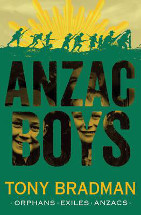Anzac Boys by Tony Bradman

Barrington Stoke, 2015. ISBN 9781781124345
It is 1906 and following the death of their mother, 12-year-old Bert
finds himself in a Catholic orphanage in London with his younger
brother Frank. Life is tough, hard and cruel with the boys living in
fear of both the bullies and the priests. One day, not long after
they arrived, they are summoned to Father Murphy's office - a place
where a visit never ends well. As they go in great trepidation, Bert
tells Frank that no matter what he will take care of him - words
that come to haunt him for a very long time.
However, instead of being in trouble the boys are informed that they
are being shipped to Australia as part of a scheme where British
orphanages provided boys to work on the farms of Western Australia.
The voyage to this new land is pretty much without incident and
lifelong friends are made, but, to their dismay, on their arrival
the boys are separated. Bert eventually discovers that Frank has
been sent to New Zealand but because "a clean break' is seen as the
best way to cope with the separation he is not allowed to know where
Frank is and cannot contact him. Throughout the harsh years that
follow, he tries to find him but is thwarted at every turn. When he
turns 16 Bert receives a letter summarily dismissing him from the
care of the orphanage and is completely left to his own devices,
unwanted as the farm labourer he has been because there are plenty
more free boys where he came from.
Still determined to find Frank, he heads for Perth and is soon swept
up in the recruitment of men for the war. Meeting up with other
mates also dismissed from the orphanage, this big new adventure
beckons and before long Bert is on his way to Egypt where he meets a
New Zealand soldier - one who wants nothing to do with him until
they confront something bigger than both of them.
Bradman has taken his inspiration for this story from the words of
the classic, haunting song And the Band Played Waltzing Matilda
by Eric Bogle bringing it to life in a very different way. It is
written in such a way that the reader gains a real insight into what
life was like for many young lads at the time and why going to war
was such an enticing alternative but which became a horrible
reality. Throughout there is a sense of hope that the brothers will
meet again and reconcile but within it there is a strong tale of
growing up, maturing and learning who you are. And being able to act
on that when push comes to shove and your brother's life is on the
line.
Specifically written and produced to fit within the publisher's
parameters of 'dyslexic friendly', it will appeal to a wide
audience and is a most worthy addition to any collection focusing on
the 100th anniversary of this important event in Australia's
history.
Barbara Braxton